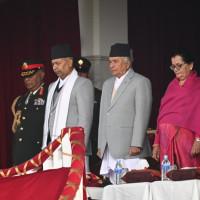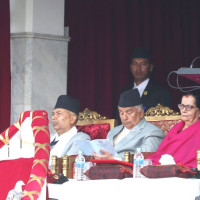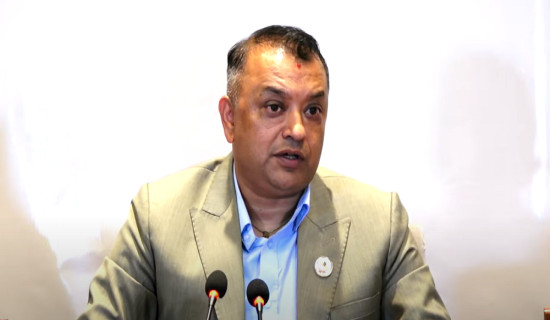- Friday, 20 February 2026
Analysis Of Media Coverage On LGBTIQ Issues
LGBTIQ+ activists and media critics argue that this gender issue in Nepali media is biased and underreported while they also acknowledge some positive media roles in disseminating legal, rights-related, and other informative materials about the community to the public. A content analysis of Nepali media by this writer, using keyword searches on Google, found a significant disparity in coverage of this community despite the media-attention it deserves. The analysis reveals the persistent inaccuracies and stereotypes in media portrayals of the community. Many Nepali media outlets and some international media platforms such as AFP, The Guardian, and The Hindu are found using the term 'third gender,' as used by the Government of Nepal.
Exclusionary efforts
The terminology, however, is opposed by the LGBTIQ+ community, who argue that it is the sign of exclusionary efforts to the LGBTIQ+ community.
Additionally, media's labeling to LGBTIQ+ community as 'third gender' is observed to be neutral and less sensitive towards
LGBTIQ+’s issues, whereas those using terms like 'Sexual and Gender minorities,' 'LGBTIQ,' and 'LGBTIQ+' exhibit greater sensitivity and empathy towards the concerns of the community.
The coverage of the LGBTIQ+ community by non-professional content producers, including YouTube, is highly problematic. Many YouTube videos about the LGBTIQ+ community in Nepal focus solely on their sexual lives, portraying them as lower-grade individuals with unnatural sexual orientation and methods. Additionally, these videos often portray the LGBTIQ+ community as aggressive in sex, with a higher sex drive and numerous sexual partners. These videos also portray this community as mentally unstable or dangerous.
Even in Nepali mainstream media, there is often a prioritisation of sensational news regarding LGBTIQ+ individuals, with a focus on sexual aspects or peculiarities. However, there is a gradual increase in positive coverage of the community.
It is true that the LGBTIQ+ community frequently face violence, often starting from their own homes, as they endure societal misconceptions and prejudice due to their sexual and gender identities. The media, however has not covered this aspect of their lives as it is supposed to be. In many such instances, the media just remains silent.
This silence can be understood through the theory of representation, which elucidates how media constructs and perpetuates stereotypes, effectively marginalising targeted groups by portraying them as the 'other' and reinforcing existing power structures.
Despite the aforementioned challenges in media coverage, media outlets have played an important role in reporting court cases, legislative proposals, and government initiatives pertaining to LGBTIQ+ rights. For instance, the landmark 2007 Supreme Court decision in Pant vs Nepal received widespread media attention, as did the government's report recommending the legalisation of same-sex marriage in 2015. Other key coverage by the media regarding the LGBTIQ community includes the Election Commission’s inclusion of a third gender option in voters list and the government’s inclusion of the third gender in the federal census.
The keyword search on Google also identified Nepali media coverage of citizenship issues for the LGBTIQ+ community, marriage registration of LGBTIQ+ individuals, and their inclusion in the 2021 census. Electoral issues relevant to the LGBTIQ+ community, such as candidates and voters from the community, were also reported in Nepali media. Notably, there were only three candidates from sexual and gender minority communities during the November 2022 elections, which was highlighted by the media outlets. They have also covered speeches from political leaders about the LGBTIQ+ community and advocated for its inclusion in school the curricula.
Profiles of prominent figures within the LGBTIQ+ community, along with interviews with activists, leaders, and individuals sharing their personal stories and experiences, received good coverage. For instance, media prioritised the inclusion of social activist Bhumika Shrestha in the 100 most Influential People in Global Policy 2019 list. Additionally, media provided extensive coverage when Shrestha bagged the 2022 International Women of Courage (IWOC) Award from the US government.
The coverage however is more guided from the global practices, market demand and audience’s need rather than media’s commitment to LGBTIQ+ rights. Despite Nepal's reputation as a country with comparatively good LGBTIQ+ rights, where significant progress has been made in legal reforms, including constitutional recognition and anti-discrimination laws, media has largely followed rather than led the government's initiatives, failing to provide insights or guidance for further reforms.
The narratives
To analyse why this trend exists, we can turn to the Agenda Setting Theory proposed by Maxwell McCombs and Donald Lewis Shaw. This theory suggests that media content creators control narratives by selecting, presenting, prioritising, or silencing news stories and shaping audience perceptions.
Due to the lack of representation of the LGBTIQ+ community in the media, the media have not been able to advocate for the interests of LGBTIQ community effectively. Furthermore, insufficient training or orientation of media personnel on LGBTIQ+ issues have hindered the media's ability to address these issues adequately.
The media should address the gap of underrepresentation, misrepresentation, and stereotypes concerning the LGBTIQ+ communities, while also prioritising the coverage of their legal issues. It's crucial to cover various facets of the LGBTIQ+ communities, use sensitive language, maintain confidentiality, and ensure stronger editorial review. Additionally, media should aim to lead rather than follow government and societal norms. It is high time we develop guidelines, such as those outlined by the Press Council of India in 2023, to address the issues of the LGBTIQ communities.
(The writer is a media researcher. pokharel.umesh@gmail.com)







-square-thumb.jpg)








